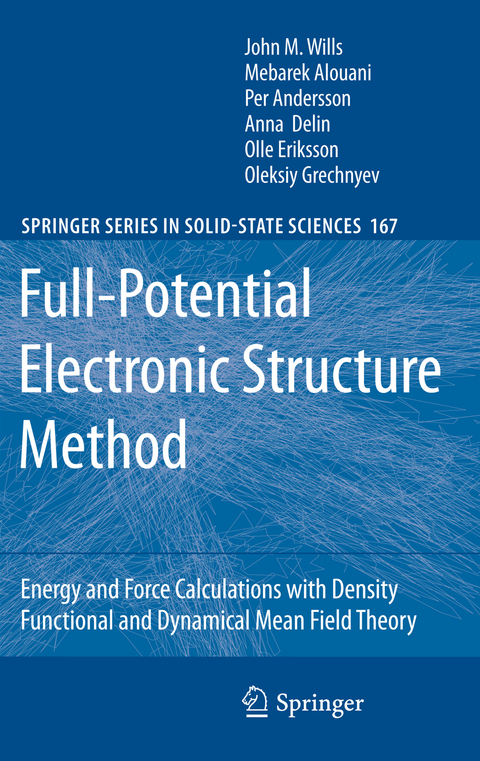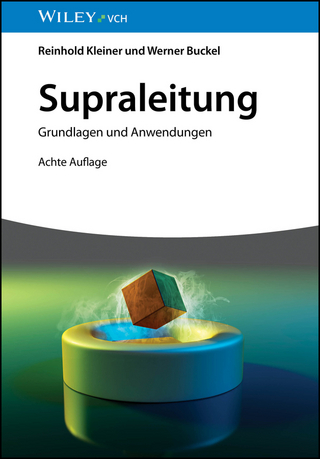
Full-Potential Electronic Structure Method
Springer Berlin (Verlag)
978-3-642-26624-9 (ISBN)
This is a book describing electronic structure theory and application within the framework of a methodology implemented in the computer code RSPt. In 1986, when the code that was to become RSPt was developed enough to be useful, it was one of the ?rst full-potential, all-electron, relativistic implem- tations of DFT (density functional theory). While RSPt was documented p- asitically in many publications describing the results of its application, it was many years before a publication explicitly describing aspects of the method appeared. In the meantime, several excellent all-electron, full-potential me- ods had been developed, published, and become available. So why a book about RSPt now? The code that became RSPt was initially developed as a personal research tool, rather than a collaborative e?ort or as a product. As such it required some knowledge of its inner workings to use, and as it was meant to be m- imally ?exible, the code required experience to be used e?ectively. These - tributes inhibited, but did not prevent, the spread of RSPt as a research tool. While applicable across the periodic table, the method is particularly useful in describing a wide range of materials, including heavier elements and c- pounds, and its ?exibility provides targeted accuracy and a convenient and accurate framework for implementing and assessing the e?ect of new models.
John Wills is a Technical Staff Member in the Theoretical Division at Los Alamos National Laboratory, current serving as Group Leader of the Physics and Chemistry of Materials Group. He has worked on electronic structure theory and application for the past 27 years, and is an author on 170 publications in this area, 61 of which are on the electronic structure of f-electron elements and compounds. Olle Eriksson has been active in the theory of electronic structure of materials for 25 years, and has published some 400 articles in this field. He is currently chair professor at the Department of Physics and Materials Science, Uppsala University. Per Andersson is currently Senior Scientist at the Swedish Defence Research Agency and has been active in the field for 15 years. Anna Delin has been active in the theory of electronic structure of materials for 15 years, and has published some 100 articles in this field. She is currently associate professor at the Department of Physics and Materials Science, Uppsala University. Oleksiy Grechnyev is has been active in the theory of electronic structure of materials and magnetism for 10 years, and has published 16 articles in this field (using name spelling A. Grechnev). He has graduated from Kharkiv National University (Ukraine) and obtained a PhD degree in Uppsala University (Sweden). He is currently researcher at Department of Theoretical Physics, B. Verkin Institute for Low Temperature Physics and Engineering (Kharkov, Ukraine). Mebarek Alouani has been working on theory of electronic structure and spectroscopy for 26 years, and has published more than 100 articles and books in this field. He is currently full professor at the Institute of Physics and Chemistry of Materials of Strasbourg (IPCMS) of the University of Strasbourg, France.
Formalisms.- Introductory Information.- Density Functional Theory and the Kohn-Sham Equation.- Consequences of Infinite Crystals and Symmetries.- to Electronic Structure Theory.- Linear Muffin-Tin Orbital Method in the Atomic Sphere Approximation.- The Full-Potential Electronic Structure Problem and RSPt.- Dynamical Mean Field Theory.- Implementation.- Obtaining RSPt from the Web.- Applications.- Total Energy and Forces: Some Numerical Examples.- Chemical Bonding of Solids.- Magnetism.- Excitated State Properties.- A Database of Electronic Structures.- Future Developments and Outlook.
From the reviews:
"The book describes the electron structure theory and its applications within the implementation by using the computer code for relativistic spin-polarized tests (RSPt). ... the book presents a very interesting attempt to create a powerful electronic database of physical properties ... . may be useful to students, post-graduate students, their teachers and researchers working in modern chemistry, physics and material sciences." (I. A. Parinov, Zentralblatt MATH, Vol. 1217, 2011)| Erscheint lt. Verlag | 27.1.2013 |
|---|---|
| Reihe/Serie | Springer Series in Solid-State Sciences |
| Zusatzinfo | XII, 200 p. |
| Verlagsort | Berlin |
| Sprache | englisch |
| Maße | 155 x 235 mm |
| Gewicht | 332 g |
| Themenwelt | Naturwissenschaften ► Physik / Astronomie ► Atom- / Kern- / Molekularphysik |
| Naturwissenschaften ► Physik / Astronomie ► Festkörperphysik | |
| Naturwissenschaften ► Physik / Astronomie ► Thermodynamik | |
| Schlagworte | chemical bonding • density functional theory • Electron Correlations • Electronic structure theory • optical properties • Potential |
| ISBN-10 | 3-642-26624-X / 364226624X |
| ISBN-13 | 978-3-642-26624-9 / 9783642266249 |
| Zustand | Neuware |
| Informationen gemäß Produktsicherheitsverordnung (GPSR) | |
| Haben Sie eine Frage zum Produkt? |
aus dem Bereich


